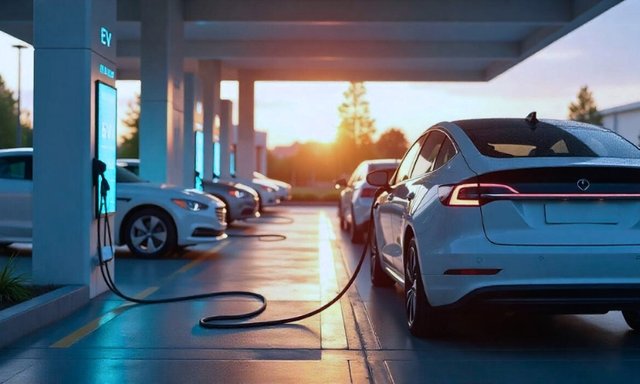How Much Does Ev Charging Cost in Bangladesh?
As an eco-friendly alternative to traditional vehicles, electric vehicles (EVs) are becoming increasingly popular in Bangladesh. However, as with any new technology, many are curious about the costs associated with owning and maintaining an EV. One of the key expenses is charging costs. So, how much does EV charging cost in Bangladesh?
The cost of EV charging in Bangladesh typically ranges from BDT 10 to BDT 20 per kWh, depending on factors such as location, charging station type, and electricity rates. Public charging stations may have varying rates, while home charging costs are influenced by local electricity tariffs and usage patterns.
To learn more about the different factors affecting EV charging costs, continue reading this article.
How Much Does Ev Charging Cost in Bangladesh? A Breakdown of Prices
The popularity of electric vehicles (EVs) is rising in Bangladesh, but many people are concerned about the costs associated with charging them. EV charging costs vary depending on several factors, ranging from BDT 10 to BDT 20 per kWh. You can predict the costs of charging an EV by understanding factors. Below are the details about factors that influence the cost:

Location of Charging Stations
Charging costs can vary based on the location of the charging station. Rates at Ev charging stations in Bangladesh are typically higher in urban areas due to greater demand. Rural locations may offer lower prices due to less infrastructure. Convenience often plays a significant role in determining local pricing.
The availability of charging stations is more concentrated in cities, leading to higher rates in these areas. Public stations in major locations may also have premium pricing for better accessibility. If you live in a remote area, you might find lower charges at less competitive stations. Pricing strategies may also differ based on local economic factors.
Type of Charging Station
The type of charging station you use affects the overall cost. Fast chargers typically cost more than regular chargers due to their speed and efficiency. Public charging stations that offer rapid charging often charge higher rates to compensate for their advanced technology. Standard home charging stations tend to be more economical.
While fast charging saves time, it might not always be the best option if you’re looking to save money. Home charging stations can offer lower rates because the electricity cost is less than that at public locations. For EV owners, it’s important to choose between cost and convenience when selecting the charging method. Station types play a crucial role in determining your total charging expenses.
Electricity Rates
The cost of electricity is a fundamental factor in determining EV charging expenses. Electricity rates in Bangladesh vary depending on government regulations and power sources. Public and residential electricity rates influence how much you pay at charging stations. Government subsidies or price adjustments can affect electricity prices.
High electricity rates can make charging an EV more expensive, especially during peak times. Lower rates may be available during off-peak hours, reducing the overall cost of charging. For home charging, your local utility provider may offer lower rates for residential consumers. Understanding local electricity tariffs can help you manage your EV’s charging costs.
Charging Time
The time of day you charge your EV can impact the cost. Peak hours generally come with higher charges due to increased demand. If you charge during off-peak hours, you might pay less because the electricity grid is less burdened. Time-based pricing models influence the cost based on when you choose to charge.
Charging an EV during nighttime or early morning may be cheaper, as power usage is lower. Some stations may have time-of-day pricing, making it crucial to plan your charging accordingly. EV owners should consider charging during off-peak hours to reduce costs. Charging time can significantly lower overall charging expenses when managed effectively.
Energy Source
The source of the energy powering the charging stations can impact prices. Renewable energy sources like solar or wind might result in lower charges compared to traditional grid power. Charging stations powered by renewable energy often have cheaper rates due to less reliance on fossil fuels. Energy mix plays a role in pricing at various stations.
Stations using fossil fuels might charge higher rates due to the cost of energy generation. Renewable sources provide an eco-friendly charging option with often lower environmental impact. Choosing charging stations powered by renewable energy can also help reduce your carbon footprint. The energy source can determine both cost and sustainability.
What Are the Long-Term Cost Benefits of Owning an EV?
Switching to an electric vehicle (EV) is an investment that can bring significant savings over time. EVs have lower operating costs compared to traditional gasoline-powered cars. Let’s explore the long-term cost benefits of owning an EV and how they help save money.

Lower Fuel Expenses
Electricity costs less than gasoline, making EVs more affordable to operate daily. Charging at home is cheaper than relying on public stations. Off-peak charging can further reduce electricity expenses, saving money over time. Fuel cost savings accumulate, making EVs a cost-effective choice in the long run.
Reduced Maintenance Costs
EVs have fewer moving parts, leading to lower maintenance expenses over time. There’s no need for oil changes, reducing routine service costs significantly. Brakes last longer due to regenerative braking, lowering replacement frequency. Fewer mechanical issues result in long-term savings on repairs and upkeep.
Government Incentives and Tax Benefits
Many governments offer tax credits and rebates for EV purchases. Incentives help lower the upfront cost, making EVs more affordable for buyers. Some areas provide discounts on registration fees, reducing ownership costs. Financial benefits from government support make EV adoption a smart financial decision.
Longer Vehicle Lifespan
EVs experience less wear and tear due to their simpler design. Battery technology improvements extend the lifespan of modern electric cars. Many EV manufacturers offer long warranties, ensuring long-term reliability. Owning an EV longer reduces the need for frequent vehicle replacements.
Higher Resale Value
Demand for used EVs is increasing, leading to strong resale values. Buyers seek affordable electric cars, ensuring good trade-in or resale prices. Technological advancements and incentives boost the market for second-hand EVs. Owning an EV can provide financial returns when it’s time to sell.
Tips on Reducing EV Charging Costs in Bangladesh
EV charging costs in Bangladesh can vary, but there are ways to reduce expenses. By following some smart tips, you can lower your overall charging bills. These simple strategies will help you save money while enjoying the benefits of owning an electric vehicle.
Charge During Off-Peak Hours
Charging during off-peak hours reduces the cost of electricity. Electricity rates tend to be lower at night. This strategy works best if your home offers flexible charging rates. Plan your charging sessions during times when demand is low for savings.
Use Home Charging Stations
Charging at home is generally cheaper than using public stations. Home charging stations often come with lower electricity rates. Installing a charging point at home can be a cost-effective long-term solution. You’ll have more control over the costs, reducing reliance on expensive public chargers.
Take Advantage of Local Incentives
Check for any local government rebates or discounts on charging equipment. Some regions offer tax benefits or financial incentives for EV owners. Incentives can lower your initial charging setup cost significantly. Stay updated on local programs to maximize your savings.
Use Public Fast Chargers Wisely
While public fast chargers are convenient, they can be more expensive. Use them only when necessary or for quick top-ups. Try to avoid over-relying on fast chargers as their rates are usually higher. Plan your trips to minimize the need for fast charging to save on costs.
Monitor Your Charging Habits
Keeping track of your charging usage can help you avoid unnecessary costs. Set a charging schedule based on your driving patterns. Monitor your consumption and adjust accordingly to avoid overcharging your vehicle. By staying aware, you can reduce unnecessary energy use and lower expenses.
Bottom Line
Being aware of how much EV charging costs in Bangladesh is crucial for managing electric vehicle expenses. Charging rates typically range from BDT 10 to BDT 20 per kWh, depending on factors such as location, charging station type, and electricity rates. To reduce costs, it's important to charge during off-peak hours, use home charging stations, and take advantage of local incentives. Aside from that, considering the energy source and monitoring your charging habits can lead to long-term savings. By staying informed and making thoughtful choices, you can optimize your EV charging costs and enjoy the many benefits of owning an electric vehicle.